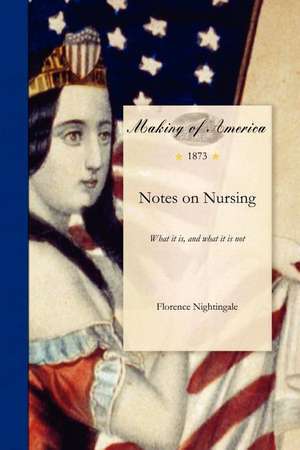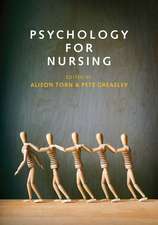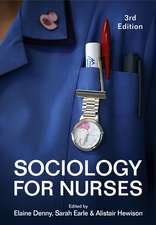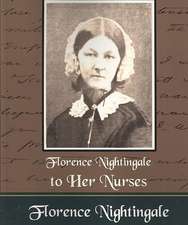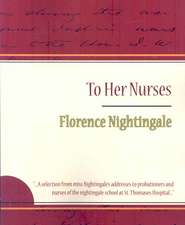Notes on Nursing: What It Is, and What It Is Not
Autor Florence Nightingale, Florence Nightingaleen Limba Engleză Paperback – 31 mai 2011
By Florence Nightingale
Contents
Ventilation and Warming
Health of Houses
Petty Management
Noise
Variety
Taking Food
What Food?
Bed and Bedding
Light
Cleanliness of Rooms and Walls
Personal Cleanliness
Chattering Hopes and Advices
Observation of the Sick
Preface
The following notes are by no means intended as a rule of thought by which nurses can teach themselves to nurse, still less as a manual to teach nurses to nurse. They are meant simply to give hints for thought to women who have personal charge of the health of others. Every woman, or at least almost every woman, in England has, at one time or another of her life, charge of the personal health of somebody, whether child or invalid, --in other words, every woman is a nurse. Every day sanitary knowledge, or the knowledge of nursing, or in other words, of how to put the constitution in such a state as that it will have no disease, or that it can recover from disease, takes a higher place. It is recognized as the knowledge which every one ought to have--distinct from medical knowledge, which only a profession can have.
If, then, every woman must, at some time or other of her life, become a nurse, i.e., have charge of somebody's health, how immense and how valuable would be the produce of her united experience if every woman would think how to nurse.
I do not pretend to teach her how, I ask her to teach herself, and for this purpose I venture to give her some hints.
Excerpt
Disease a reparative process.
Shall we begin by taking it as a general principle--that all disease, at some period or other of its course, is more or less a reparative process, not necessarily accompanied with suffering: an effort of nature to remedy a process of poisoning or of decay, which has taken place weeks, months, sometimes years beforehand, unnoticed, the termination of the disease being then, while the antecedent process was going on, determined?
If we accept this as a general principle we shall be immediately met with anecdotes and instances to prove the contrary. Just so if we were to take, as a principle-all the climates of the earth are meant to be made habitable for man, by the efforts of man-the objection would be immediately raised, -Will the top of Mont Blanc ever be made habitable? Our answer would be, it will be many thousands of years before we have reached the bottom of Mont Blanc in making the earth healthy. Wait till we have reached the bottom before we discuss the top.
In watching disease, both in private houses and in public hospitals, the thing which strikes the experienced observer most...
------------------------------------------------------------------------------------------------------------------------------------------
Windham Press is committed to bringing the lost cultural heritage of ages past into the 21st century through high-quality reproductions of original, classic printed works at affordable prices.
This book has been carefully crafted to utilize the original images of antique books rather than error-prone OCR text. This also preserves the work of the original typesetters of these classics, unknown craftsmen who laid out the text, often by hand, of each and every page you will read. Their subtle art involving judgment and interaction with the text is in many ways superior and more human than the mechanical methods utilized today, and gave each book a unique, hand-crafted feel in its text that connected the reader organically to the art of bindery and book-making.
We think these benefits are worth the occasional imperfection resulting from the age of these books at the time of scanning, and their vintage feel provides a connection to the past that goes beyond the mere words of the text.
Preț: 80.57 lei
Nou
Puncte Express: 121
Preț estimativ în valută:
15.43€ • 15.90$ • 12.93£
15.43€ • 15.90$ • 12.93£
Carte tipărită la comandă
Livrare economică 24 februarie-10 martie
Preluare comenzi: 021 569.72.76
Specificații
ISBN-13: 9781458500618
ISBN-10: 1458500616
Pagini: 148
Dimensiuni: 152 x 229 x 9 mm
Greutate: 0.23 kg
Editura: University of Michigan Library
ISBN-10: 1458500616
Pagini: 148
Dimensiuni: 152 x 229 x 9 mm
Greutate: 0.23 kg
Editura: University of Michigan Library
Descriere
Descriere de la o altă ediție sau format:
Be inspired by the timeless insights of the woman who created the foundations of modern nursing, with Florence Nightingale’s Notes On Nursing , the 160th Anniversary Edition.
Supported by essays from modern-day nurses, this still-relevant work offers concise, on-the-ground experience and breakthrough insights into the crucial elements of patient care. Each chapter brings to life Nightingale’s determination to advance the healthcare system of her time, empowering modern nursing professionals, educators, and students of all levels to establish their own crucial findings and innovations.
Power up your professional commitment by diving into Nightingale’s bravery and groundbreaking vision:
Foundational findings and instruction on the importance of adequate room ventilation, management of the patient’s environment, what it means to be in charge as a nurse, patient observation, nutrition, appropriate lighting, and cleanliness of beds and rooms
Supported by essays from modern-day nurses, this still-relevant work offers concise, on-the-ground experience and breakthrough insights into the crucial elements of patient care. Each chapter brings to life Nightingale’s determination to advance the healthcare system of her time, empowering modern nursing professionals, educators, and students of all levels to establish their own crucial findings and innovations.
Power up your professional commitment by diving into Nightingale’s bravery and groundbreaking vision:
Foundational findings and instruction on the importance of adequate room ventilation, management of the patient’s environment, what it means to be in charge as a nurse, patient observation, nutrition, appropriate lighting, and cleanliness of beds and rooms
- Seasoned guidance and reflections on Nightingale’s writings from experienced nurses, nurse educators, and professional development practitioners, including:
- The palliative care perspective
- Advanced nursing practice and midwifery
- The influence of the nurse on patient emotional state and overall well-being
- Professional identity and inspiration
- A tribute to Notes on Nursing
- Preparing to be a nurse educator
- Issues ranging from bedsores to global health care
- Offers Nightingale’s principles of health —her holistic viewpoint and understanding of how sickroom environment, patient mindset, and patient inner mental/emotional struggles affect health and recovery
- Emphasizes the importance of assisting in patient well-being on all levels of health and well-being
- Perfectly supports the current emphasis on research and evidence-based practice by using data to support arguments for offering compassionate, quality care—illuminates all levels of nursing practice, education, and research
Notă biografică
Florence Nightingale /¿nät¿n¿e¿l/, OM, RRC, DStJ (12 May 1820 - 13 August 1910) was a British social reformer and statistician, and the founder of modern nursing.
Nightingale came to prominence while serving as a manager and trainer of nurses during the Crimean War, in which she organised care for wounded soldiers.[3] She gave nursing a favourable reputation and became an icon of Victorian culture, especially in the persona of "The Lady with the Lamp" making rounds of wounded soldiers at night.[4][5]
Recent commentators have asserted Nightingale's Crimean War achievements were exaggerated by media at the time, but critics agree on the importance of her later work in professionalising nursing roles for women.[6] In 1860, Nightingale laid the foundation of professional nursing with the establishment of her nursing school at St Thomas' Hospital in London. It was the first secular nursing school in the world, and is now part of King's College London. In recognition of her pioneering work in nursing, the Nightingale Pledge taken by new nurses, and the Florence Nightingale Medal, the highest international distinction a nurse can achieve, were named in her honour, and the annual International Nurses Day is celebrated on her birthday. Her social reforms included improving healthcare for all sections of British society, advocating better hunger relief in India, helping to abolish prostitution laws that were harsh for women, and expanding the acceptable forms of female participation in the workforce.
Nightingale was a prodigious and versatile writer. In her lifetime, much of her published work was concerned with spreading medical knowledge. Some of her tracts were written in simple English so that they could easily be understood by those with poor literary skills. She was also a pioneer in data visualization with the use of infographics, effectively using graphical presentations of statistical data.[6] Much of her writing, including her extensive work on religion and mysticism, has only been published posthumously.
Cuprins
Introductory; 1. Ventilation and warming; 2. Health of houses; 3. Petty management; 4. Noise; 5. Variety; 6. Taking food; 7. What food; 8. Bed and bedding; 9. Light; 10. Cleanliness of rooms and walls; 11. Personal cleanliness; 12. Chattering hopes and advices; 13. Observation of the sick; Conclusion; Supplementary chapter.
